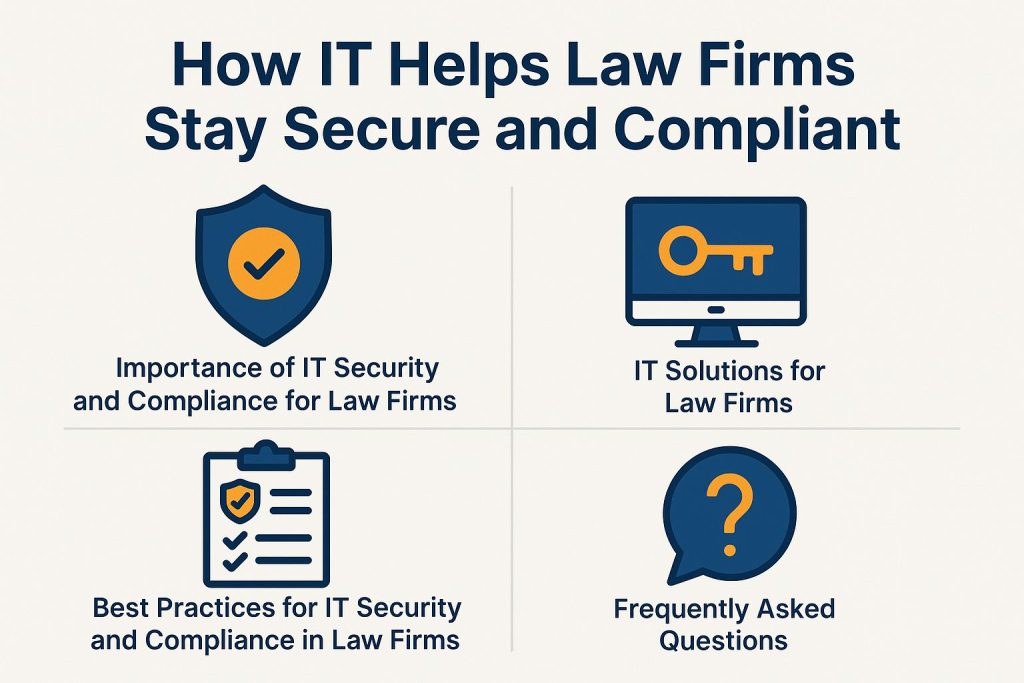How IT Services Help Greenville Law Firms Stay Compliant

In an era where legal compliance is paramount, Greenville law firms face mounting pressures to meet stringent regulations. IT services have become essential partners for legal practices. They help navigate complex compliance landscapes. This article shows how IT solutions improve data security, simplify case management, and offer training for legal professionals, ultimately safeguarding firms against potential pitfalls. The integration of IT services not only mitigates risks but also paves the way for a more efficient and compliant legal practice.
Understanding Compliance Requirements and Information Governance

Law firms are required to navigate a complex landscape of compliance requirements to safeguard client data and uphold legal integrity. Regulatory compliance and information governance are critical for Greenville law firms.
Legal Regulations Affecting Law Firms and IT Governance
Key regulations such as GDPR, HIPAA, and AML have a significant impact on law firms, requiring specific compliance strategies, including IT governance, to avoid penalties.
To comply with GDPR, law firms must establish clear data processing agreements, ensure that client consent is thoroughly documented, and use structured data management practices. In the case of HIPAA, safeguards are essential to protect sensitive health information, which may include secure communication tools such as SecureMail, My Health Record, and mobile technology solutions.
Additionally, AML regulations require firms to conduct risk assessments and perform customer due diligence, often supported by software like Comply Advantage for real-time monitoring and technology risk assessments.
Compliance management software can help firms track elements. This supports meeting legal obligations and reduces the risk of fines.
Role of IT Services and Technology Consulting in Compliance

IT services help law firms meet regulatory standards, protect data, and stay compliant with evolving legal and security requirements. They deliver data security, adhere to privacy laws, and provide protection solutions for law firms.
Data Security, Privacy Management, and Disaster Recovery
Effective data security measures reduce breach risks and protect client confidentiality. This is critical for firms that manage sensitive information.
To enhance data security and prevent data breach incidents, it is advisable to implement a multi-layered strategy. Establishing firewalls can block unauthorized access, while deploying endpoint security software, such as Norton Security, helps detect and neutralize malware on devices. Utilizing peer-to-peer networking solutions can further strengthen network security.
Training staff on data privacy protocols is essential; holding regular workshops with phishing simulations is beneficial, alongside compliance training sessions. Statistics indicate that firms that employ these measures, combined with IT audits and compliance monitoring, report a 50% decrease in breach incidents.
Additionally, conducting regular audits can identify vulnerabilities, ensuring that the security framework remains robust against evolving threats through compliance monitoring.
Case Management Systems and Legal Software Solutions
Implementing a robust case management system, along with legal software solutions, can streamline legal processes, improve organization, and enhance client service. Among the leading options, Clio provides features such as automated workflows, comprehensive time tracking, and project management solutions. This allows firms to significantly reduce their administrative workload; for example, a law firm utilizing Clio reported a 30% decrease in time spent on billable tasks, optimizing workflow efficiency.
PracticePanther excels in document and digital evidence management. It enables users to store and share files easily.
A case study showed that PracticePanther improved document retrieval speeds by 40%. This enhances client relationship management and speeds up responses to client inquiries.
Using these systems enhances operational efficiency. It also builds stronger client relationships and supports mobile device management.
Training and Support for Staff and Legal Tech Innovations
Ongoing training, legal tech innovations, and IT support are essential. They maximize technology benefits in legal practices and ensure staff competency. For effective training, organizations should use platforms like LearnDash for courses or Udemy for Business for various topics. These include technology adoption and structured data management.
Establish a training framework. Include quarterly workshops for new technology. Follow with assessments to measure skills and ensure effective IT policy development. A dedicated IT support team is crucial. They assist with technical issues and system updates, allowing staff to focus on their main tasks without long downtimes.
This strategic combination fosters a culture of continuous learning and adaptation, supported by legal research tools, which is vital for success in a technology-driven environment.
Frequently Asked Questions About Legal Data Analytics
What are IT services? How do they help Greenville law firms stay compliant?
IT services refer to the support and management of a law firm’s information technology systems and IT infrastructure. They can help with maintaining and securing sensitive data, ensuring compliance with industry regulations, improving overall efficiency, and supporting a virtual law office.
What compliance regulations and IT frameworks must Greenville law firms follow?
Greenville law firms must comply with various regulations, including the Health Insurance Portability and Accountability Act (HIPAA), the Sarbanes-Oxley Act (SOX), and the Gramm-Leach-Bliley Act (GLBA), along with IT compliance frameworks. IT services can help ensure compliance with these and other regulations, including financial compliance requirements.
How do IT services improve data security for Greenville law firms?
IT services can implement security measures such as firewalls, encryption, and data backup solutions to protect sensitive information from cyber threats and strengthen network infrastructure. They can also conduct regular security audits, IT cost management, and training for employees to mitigate potential risks.
What are the benefits of IT services for compliance and digital transformation in law firms?
By utilizing IT services, law firms can improve data security, reduce the risk of non-compliance penalties, increase overall efficiency, and leverage digital transformation strategies. This can lead to improved client trust, stronger reputation in the legal industry, and effective client data management.
Do IT services offer support for compliance audits and legal billing software for Greenville law firms?
Yes, IT services can assist with compliance audits, legal billing software integrations, and provide documentation of the firm’s adherence to regulations. This can help law firms prepare for and pass audits with ease and support managed IT services.
What should Greenville law firms look for in an IT services provider for compliance support and remote monitoring?
A law firm should look for an IT services provider with experience and expertise in compliance regulations, a strong track record of data security, and a commitment to ongoing support and training to ensure continued compliance, including remote monitoring solutions. It is also important to choose a provider with a thorough understanding of the specific needs of the legal industry, offering technology consulting and process automation services.




